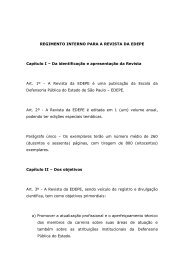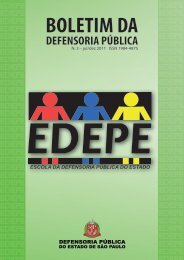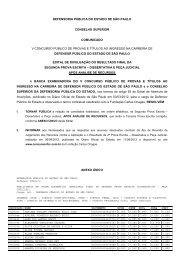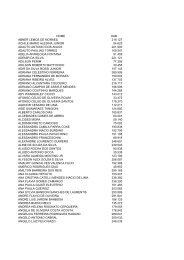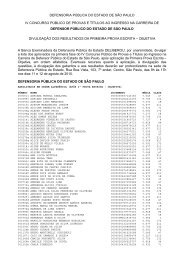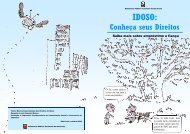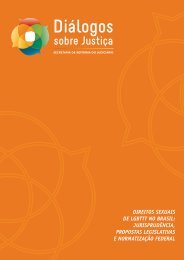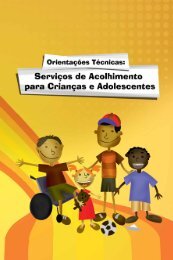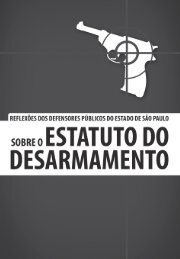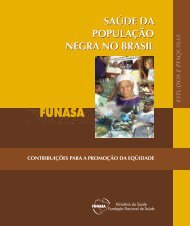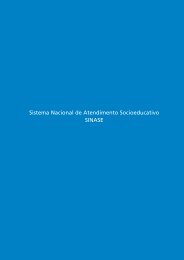Direitos e deveres dos solicitantes de refúgio no Brasil
Direitos e deveres dos solicitantes de refúgio no Brasil
Direitos e deveres dos solicitantes de refúgio no Brasil
- No tags were found...
Create successful ePaper yourself
Turn your PDF publications into a flip-book with our unique Google optimized e-Paper software.
<strong>Direitos</strong> e <strong><strong>de</strong>veres</strong><strong>dos</strong> <strong>solicitantes</strong> <strong>de</strong>refúgio <strong>no</strong> <strong>Brasil</strong>Rights and duties of asylum seekers in BrazilDroits et <strong>de</strong>voirs <strong>de</strong>s <strong>de</strong>man<strong>de</strong>urs d’asile au BrésilDerechos y <strong>de</strong>beres <strong>de</strong> los <strong>solicitantes</strong> <strong>de</strong> asilo en <strong>Brasil</strong>
Edição final: Gabriel Guala<strong>no</strong> <strong>de</strong> GodoyFotos: @ACNURProjeto gráfico e diagramação: Compasso Comunicação – www.artecompasso.com.brPara mais informações entrar em contato com o Escritório do ACNUR <strong>no</strong> <strong>Brasil</strong>.Caixa Postal 8560, CEP: 70312-970, Brasília / DF, <strong>Brasil</strong>Telefone: (61) 3044 5744Correio Eletrônico: brabr@unhcr.orgWebsite: www.acnur.org.brTwitter: @ACNUR<strong>Brasil</strong>
<strong>Direitos</strong> e <strong><strong>de</strong>veres</strong><strong>dos</strong> <strong>solicitantes</strong> <strong>de</strong>refúgio <strong>no</strong> <strong>Brasil</strong>Rights and duties of asylum seekers in BrazilDroits et obligations <strong>de</strong>s <strong>de</strong>man<strong>de</strong>urs d’asile au BrésilDerechos y obligaciones <strong>de</strong> los <strong>solicitantes</strong> <strong>de</strong> asilo en <strong>Brasil</strong><strong>Brasil</strong>, 2010
As Nações Unidas atribuíram ao ACNUR o mandato <strong>de</strong>conduzir e coor<strong>de</strong>nar ações internacionais para proteção<strong>dos</strong> refugia<strong>dos</strong> e a busca por soluções duradouras paraseus problemas.
PORTUGUÊS
Quem são os refugia<strong>dos</strong>?São to<strong>dos</strong> os homens e mulheres (incluindo i<strong>dos</strong>os, jovens e crianças) que foramobriga<strong>dos</strong> a <strong>de</strong>ixar seus países <strong>de</strong> origem por causa <strong>de</strong> um fundado temor <strong>de</strong>perseguição por motivos <strong>de</strong> raça, religião, nacionalida<strong>de</strong>, por pertencer a um<strong>de</strong>terminado grupo social ou por suas opiniões políticas.A legislação brasileira sobre refúgio (Lei 9.474 <strong>de</strong> 22 <strong>de</strong> julho <strong>de</strong> 1997) também reconhececomo refugiadas as pessoas que foram obrigadas a sair <strong>de</strong> seus países <strong>de</strong>vidoa conflitos arma<strong>dos</strong>, violência e violação generalizada <strong>de</strong> direitos huma<strong>no</strong>s.As pessoas que cometeram crimes contra a humanida<strong>de</strong>, <strong>de</strong> guerra, contra apaz e crimes hedion<strong>dos</strong> ou que participaram <strong>de</strong> atos terroristas ou <strong>de</strong> tráfico <strong>de</strong>drogas não po<strong>de</strong>rão se beneficiar da condição <strong>de</strong> refugiado.Quem são os migrantes?São todas as pessoas que <strong>de</strong>ixam seus países <strong>de</strong> origem com o objetivo <strong>de</strong> seestabelecer em outro, <strong>de</strong> forma temporal ou permanente. Os migrantes têm, emgeral, motivações sociais e econômicas, pois fogem da pobreza ou do <strong>de</strong>sempregoe buscam melhores condições <strong>de</strong> vida, como melhor acesso a trabalho,saú<strong>de</strong> e educação.
É missão do ACNUR asseguraros direitos e o bem-estar<strong>dos</strong> refugia<strong>dos</strong>. O ACNURempenha-se em garantir quequalquer pessoa possa exercero direito <strong>de</strong> buscar e gozar <strong>de</strong>refúgio seguro em outro país.PORTUGUÊSPor que solicitar refúgio?O <strong>Brasil</strong> assumiu o compromisso internacional <strong>de</strong> fornecer proteção a refugia<strong>dos</strong>que, como qualquer cidadão brasileiro, buscam integração e sustento. Asolicitação formal <strong>de</strong> refúgio regulariza, temporariamente, a permanência <strong>dos</strong>olicitante <strong>no</strong> <strong>Brasil</strong>, garantindo o direito ao trabalho e o acesso aos serviçospúblicos <strong>de</strong> saú<strong>de</strong> e educação.Se o pedido for negado, o estrangeiro <strong>de</strong>verá regularizar sua permanência <strong>no</strong>país, solicitando um visto. Caso o visto seja negado, <strong>de</strong>ve-se abandonar o territórionacional. Depois <strong>de</strong> quatro a<strong>no</strong>s <strong>de</strong> residência regularizada <strong>no</strong> país, osrefugia<strong>dos</strong> po<strong>de</strong>m solicitar um visto <strong>de</strong> permanência <strong>no</strong> <strong>Brasil</strong>.A solicitação <strong>de</strong> refúgio é extremamente importante porque caso um estrangeiro,em necessida<strong>de</strong> <strong>de</strong> proteção internacional não solicite refúgio, eleestará automaticamente em situação irregular <strong>no</strong> país. Contudo, mesmo sobessa condição, sua integrida<strong>de</strong> e dignida<strong>de</strong> <strong>de</strong>verão ser respeitadas <strong>de</strong> acordocom a legislação brasileira e os princípios <strong>dos</strong> direitos huma<strong>no</strong>s. No tocante aosrefugia<strong>dos</strong> e <strong>solicitantes</strong> <strong>de</strong> refúgio, a lei brasileira não permite sua <strong>de</strong>voluçãoao país <strong>de</strong> origem.
Como solicitar refúgio <strong>no</strong> <strong>Brasil</strong>?Ao entrar <strong>no</strong> <strong>Brasil</strong>, o estrangeiro que se consi<strong>de</strong>ra vítima <strong>de</strong> perseguição em seupaís <strong>de</strong> origem <strong>de</strong>ve procurar qualquer <strong>de</strong>legacia da Polícia Fe<strong>de</strong>ral ou autorida<strong>de</strong>migratória na fronteira e solicitar formalmente a proteção do gover<strong>no</strong> brasileiro.Deve-se buscar a Polícia Fe<strong>de</strong>ral preferencialmente assim que cruzar a fronteira.No entanto, a solicitação <strong>de</strong> refúgio po<strong>de</strong> ser feita a qualquer momento, aindaque o estrangeiro já esteja <strong>no</strong> <strong>Brasil</strong> há algum tempo. Seu pedido será encaminhado,para avaliação, ao Comitê Nacional para Refugia<strong>dos</strong> (CONARE) – órgãovinculado ao Ministério da Justiça do <strong>Brasil</strong>.Passo a passo para a solicitação <strong>de</strong> refúgio1. Pedido <strong>de</strong> refúgio na Polícia Fe<strong>de</strong>ral: o solicitante preencherá um formulárioe será entrevistado. Caso o solicitante não fale português, a entrevistaserá traduzida. Feito isso, a Polícia Fe<strong>de</strong>ral efetuará o Termo <strong>de</strong> Declaração,que será encaminhado ao CONARE.2. Protocolo provisório <strong>de</strong> solicitação <strong>de</strong> refúgio: após receber o Termo<strong>de</strong> Declaração, o CONARE expedirá <strong>de</strong>claração que autoriza a emissão doprotocolo provisório <strong>de</strong> solicitação <strong>de</strong> refúgio. O Protocolo é extremamenteimportante, já que é o documento <strong>de</strong> i<strong>de</strong>ntida<strong>de</strong> do solicitante até a análise<strong>de</strong> seu caso. Com o Protocolo, o solicitante po<strong>de</strong>rá tirar o Cadastro <strong>de</strong>Pessoa Física (CPF) e a Carteira <strong>de</strong> Trabalho. O documento tem valida<strong>de</strong> <strong>de</strong>três meses e <strong>de</strong>verá ser re<strong>no</strong>vado na Polícia Fe<strong>de</strong>ral até o solicitante ter suaresposta final.3. Entrevista com representante do CONARE: tendo feito o pedido <strong>de</strong> refúgio,a Polícia Fe<strong>de</strong>ral entrará em contato para que seja realizada a entrevistacom representante do CONARE. Essa entrevista servirá para os membros doCONARE analisarem o pedido <strong>de</strong> refúgio. Por isso, se o solicitante mudar <strong>de</strong>cida<strong>de</strong>, ele <strong>de</strong>ve informar à Polícia Fe<strong>de</strong>ral seu <strong>no</strong>vo en<strong>de</strong>reço.
<strong>Direitos</strong> e <strong><strong>de</strong>veres</strong> <strong>dos</strong> <strong>solicitantes</strong> <strong>de</strong> refúgio<strong>Direitos</strong>:• Ter acesso ao procedimento legal <strong>de</strong> solicitação <strong>de</strong> refúgio, gratuitamente esem necessida<strong>de</strong> <strong>de</strong> advogado;• Não ser <strong>de</strong>volvido para seu país <strong>de</strong> origem ou para on<strong>de</strong> possa ser vítima<strong>de</strong> violações <strong>de</strong> direitos huma<strong>no</strong>s;• Não ser discriminado pelas autorida<strong>de</strong>s governamentais e pela socieda<strong>de</strong>;• Não ser punido por entrada irregular <strong>no</strong> país;• Solicitar, por meio da reunião familiar, a extensão da condição <strong>de</strong> refugiadopara parentes (cônjuges, ascen<strong>de</strong>ntes e <strong>de</strong>scen<strong>de</strong>ntes) e <strong>de</strong>mais componentesdo grupo familiar que se encontrem <strong>no</strong> território nacional, conformeestabelece a Lei 9.474 e a Resolução Normativa n o 4 do CONARE;• Receber toda a documentação assegurada pela legislação: ProtocoloProvisório, Registro Nacional <strong>de</strong> Estrangeiros (RNE), Cadastro <strong>de</strong> PessoaFísica (CPF), Carteira <strong>de</strong> Trabalho e passaporte para estrangeiro – <strong>no</strong> caso<strong>de</strong> viagens previamente autorizadas pelo CONARE;• Ter os mesmos direitos e a mesma assistência básica <strong>de</strong> qualquer outroestrangeiro que resida legalmente <strong>no</strong> país, entre eles direitos civis básicos(como liberda<strong>de</strong> <strong>de</strong> pensamento e <strong>de</strong> <strong>de</strong>slocamento e não-sujeição à torturae a tratamentos cruéis e <strong>de</strong>gradantes) e direitos econômicos, sociais eculturais (como acesso aos serviços <strong>de</strong> saú<strong>de</strong> pública e educação, direito aotrabalho e à liberda<strong>de</strong> <strong>de</strong> culto);• Escolher livremente o lugar <strong>de</strong> residência <strong>no</strong> território nacional;• Requerer a permanência após ter vivido quatro a<strong>no</strong>s <strong>no</strong> país, ou um a<strong>no</strong>,caso seja nacional <strong>de</strong> um país <strong>de</strong> língua portuguesa;• Solicitar a permanência <strong>no</strong> <strong>Brasil</strong> em razão <strong>de</strong> ter cônjuge ou filho brasileiro; • Reivindicar o acesso a procedimentos facilita<strong>dos</strong> para o reconhecimento <strong>de</strong>certifica<strong>dos</strong> e diplomas.
Contatos úteisComitê Nacional para os Refugia<strong>dos</strong> – CONARETelefone: (61) 2025 9225website: www.mj.gov.br/conare | Correio Eletrônico: conare@mj.gov.brAlto Comissariado das Naçoes Unidas para Refugia<strong>dos</strong> – ACNUR:Telefones:Escritório Brasília: (61) 3044 5744Escritório Manaus: (92) 3233 0288website: www.acnur.org.br | Correio Eletrônico: brabr@unhcr.orgMinistério do Trabalho e Emprego – MTETelefone: (61) 3317 6000website: www.mte.gov.brConselho Nacional <strong>de</strong> Imigração – CNIgTelefone: (61) 3317 6470website: www.mte.gov.br/cniMinistério da Justiça - MJ:Telefone: (61) 2025 3587website: www.mj.gov.brPolícia Fe<strong>de</strong>ral – PF:Telefones:Brasília: (61) 3364 9259São Paulo: (11) 3538 5000Rio <strong>de</strong> Janeiro: (21) 3398 3198Manaus: (92) 3655 1515website: www.dpf.gov.brSecretaria Especial <strong>de</strong> <strong>Direitos</strong> Huma<strong>no</strong>s – SEDH:Telefone: (61) 2025 3536website: www.sedh.gov.br | Correio Eletrônico: direitoshuma<strong>no</strong>s@sedh.org.brOuvidoria Geral da Cidadania – telefone: (61) 2025 3116
A participação <strong>dos</strong> refugia<strong>dos</strong>nas <strong>de</strong>cisões que refletemem suas vidas é um princípioessencial da ação do ACNUR.PORTUGUÊSSocieda<strong>de</strong> CivilCáritas Arquidiocesana do Rio <strong>de</strong> JaneiroTelefone: (21) 2567-4177 / 2567-4105Correio Eletrônico: carj.refugia<strong>dos</strong>@caritas-rj.org.brCáritas Arquidiocesana <strong>de</strong> São PauloTelefone: (11) 3115-2674 / 3241-3239Correio Eletrônico: casp.refugia<strong>dos</strong>@uol.com.brCaritas Arquidiocesana <strong>de</strong> ManausTelefone: (92) 3212 9030Correio Eletrônico: caritas@arquimanaus.org.brInstituto Migrações e <strong>Direitos</strong> Huma<strong>no</strong>sTelefone: (61) 3340-2689Correio Eletrônico: imdh@migrante.org.br | website: www.migrante.org.brAssociação Antônio VieiraTelefone: (51) 3254-0140Correio Eletrônico: refugia<strong>dos</strong>9474@yahoo.com.br | website: www.asav.org.brCentro <strong>de</strong> Defesa <strong>dos</strong> <strong>Direitos</strong> Huma<strong>no</strong>sTelefone: (11) 2358-9606Correio Eletrônico: cddh.guarulhos@gmail.com
UNHCR is mandated by the United Nations tolead and coordinate international action for theworldwi<strong>de</strong> protection of refugees and to search fordurable solutions to their problems.
ENGLISH
Who are the refugees?Refugees are all men and women (including el<strong>de</strong>rly, young persons and children)who were obliged to leave their countries due to a well foun<strong>de</strong>d fear ofbeing persecuted for reasons of race, religion, nationality, membership of a particularsocial group or support of a political opinion.The Brazilian law on refugees (Law 9.474 of June 22nd 1997) also recognizesrefugees as persons who were forced to leave their countries of origin becauseof armed conflicts, violence and massive human rights violations.People who committed crimes against humanity, war crimes, crimes againstpeace and hei<strong>no</strong>us crimes or who took part in terrorist acts or drug traffickingare <strong>no</strong>t eligible to receive refugee status.Who is consi<strong>de</strong>red a migrant?Migrants are persons who left their countries of origin aiming at living in a<strong>no</strong>therplace, temporally or permanently. Migrants usually have social and eco<strong>no</strong>micmotivations, once they flee from poverty or unemployment and look forbetter life conditions, such as better access to work, health or education.
UNHCR’s primary purpose isto safeguard the rights andwell-being of refugees. TheUNHCR strives to ensure thateveryone can exercise theright to seek asylum and findsafe refuge in a<strong>no</strong>ther State.Why request asylum?Brazil has ma<strong>de</strong> an international commitment to grant protection to refugeeswho seek integration and support, like any Brazilian citizen. The formal asylumrequest temporarily regularizes the applicant’s stay in Brazil, securing their rightto work and access to public health and education services.If the request is <strong>de</strong>nied, the applicant shall regularize his/her permanency inthe country by applying for a visa. In case the visa is also refused, he/she mustleave Brazilian national territory. According to the Brazilian legislation, refugeesmay apply for a permanent visa after living at least four years in the country.ENGLISHThe asylum request is extremely important because a foreigner in need of internationalprotection without proper documentation will automatically bein an irregular situation in the country. Nonetheless, even in this case, integrityand dignity must be respected according to human rights principles andthe Brazilian legislation on the matter.Irregular immigration is <strong>no</strong>t a crime, however, an irregular migrant may be compulsorilywithdrawn, <strong>de</strong>ported or expelled from Brazilian national territory. Regardingrefugees and asylum seekers, Brazilian immigration laws do <strong>no</strong>t allow aforced return (<strong>no</strong>n-refoulement) to their country of origin.
How to request refuge in Brazil?When entering the country, a foreigner who consi<strong>de</strong>rs him/hers self a victim ofpersecution in their country of origin should go to any Fe<strong>de</strong>ral Police statio<strong>no</strong>r immigration authority at the bor<strong>de</strong>r and formally request protection fromthe Brazilian government. It is strongly recommen<strong>de</strong>d that one should seek theFe<strong>de</strong>ral Police as soon as crossing the bor<strong>de</strong>r.The asylum request may be done, however, at any time even if the foreigner hasalready been in Brazil for some time. The request will be forwar<strong>de</strong>d for evaluationto the National Committee for Refugees (CONARE) – entailed to the Ministryof Justice of Brazil.Step-by-Step of the Asylum Request1. Asylum Request at the Fe<strong>de</strong>ral Police: the applicant will fill in a formand be interviewed. If the applicant does <strong>no</strong>t speak Portuguese, the interviewwill be translated. Having done that, the Fe<strong>de</strong>ral Police will forwardhis Statement to CONARE.2. Temporary asylum seeker document: after receiving the applicants’Statement, CONARE will issue a <strong>de</strong>claration that autorizes the issuance of atemporary asylum seeker document which will be <strong>de</strong>livered to the asylum seekerby the Fe<strong>de</strong>ral Police. The temporary document is extremely importantas it constitutes the applicant’s i<strong>de</strong>ntity document until the case is analyzed.Once with the temporary asylum seeker document, the applicant can obtaina Brazilian Tax Number (Cadastro <strong>de</strong> Pessoa Física - CPF) and a Work Permit(Carteira <strong>de</strong> Trabalho). The document is valid for three months and must berenewed at the Fe<strong>de</strong>ral Police until the applicant has a final answer.3. Interview with a CONARE’s representative: After officially requestingasylum, the applicant will be contacted by the Fe<strong>de</strong>ral Police so that he/shecan be interviewed by a representative of CONARE. Such interview will gui<strong>de</strong>CONARE on the analysis of the asylum request. Therefore, if the applicant
By assisting refugees to returnto their own country or to settlepermanently in a<strong>no</strong>ther country,UNHCR also seeks lastingsolutions to their plight.moves to a<strong>no</strong>ther city, he/she must <strong>no</strong>tify the Fe<strong>de</strong>ral Police of the newaddress in advance.4. Decisions regarding the asylum request4.1 Positive <strong>de</strong>cision from CONARE: The applicant has to pick upthe <strong>de</strong>cision at the Fe<strong>de</strong>ral Police. If the <strong>de</strong>cision is positive, theFe<strong>de</strong>ral Police will begin the procedures for issuing the NationalRegistration of Foreigners (Registro Nacional <strong>de</strong> Estrangeiro -RNE), an i<strong>de</strong>ntity document valid for foreigners in Brazil.ENGLISH4.2 Negative <strong>de</strong>cision from CONARE: If the applicant is <strong>no</strong>trecognized as a refugee, he/she will be <strong>no</strong>tified of the <strong>de</strong>cisionby the Fe<strong>de</strong>ral Police. The applicant may make an appeal to theMinistry of Justice for analysis, within 15 days of the <strong>de</strong>cision.4.3 Negative <strong>de</strong>cision from the Ministry of Justice: The applicantwill also be <strong>no</strong>tified of this <strong>de</strong>cision by the Fe<strong>de</strong>ral Police. If theMinistry of Justice <strong>de</strong>nies the appeal, the applicant will be subjectto the national legislation concerning foreigners in the country.
Rights and duties of asylum seekersRights:• To have access to the legal procedure of requesting asylum, free of chargeand with <strong>no</strong> need of a lawyer;• Not to be returned to their country of origin or to where they might sufferhuman rights violations;• Not to be discriminated by governmental authorities or by society;• Not to be punished for irregular entry in the country;• Request, through family reunion, the extension of the refugees status torelatives (partner, ascendants and <strong>de</strong>scen<strong>de</strong>nts) and also other componentsof the family group who are in national territory, according to the Law9.474 and the Normative Resolution nº4 of CONARE.• Receive all documentation provi<strong>de</strong>d by the legislation: Temporary asylumseeker document, National Registration of Foreigners (RNE), Tax Number(CPF), Work Permit (Carteira <strong>de</strong> Trabalho) and passport for foreigners - inthe case of travels previously authorized by CONARE;• To have the same rights and the same basic assistance of any otherforeigners who live according to the law in the country, among them: basiccivil rights (such as freedom of thought and movement and <strong>no</strong>t to be subjectto torture or cruel and <strong>de</strong>grading treatment) and the eco<strong>no</strong>mic, social andcultural rights (such as access to health and educational public services,right to work and religious freedom);• Choose freely where to live in the national territory;• Request permanency after four years living in Brazil as a refugee, or a yearif the refugee is a national of a Portuguese-speaking country;• Request permanency in Brazil if the refugee has a Brazilian partner orchildren born in Brazilian territory; • Claim access to facilitated procedures for the recognition of certificates anddiplomas.
Duties:• Do <strong>no</strong>t perform acts contrary to national security or public or<strong>de</strong>r, un<strong>de</strong>rpenalty of losing the refugee status;• Respect the Constitution and the laws of Brazil like all Brazilians andforeigners residing in the country. In case of committing any crimeor offense, the refugee will have the same legal treatment given toBrazilian citizens;• Particularly <strong>no</strong>te the specific laws that protect children, adolescents andwomen.• Inform the Fe<strong>de</strong>ral Police and CONARE, within 30 days, in case ofaddress changes;• Keep your documentation up-to-date;• Do <strong>no</strong>t leave national territory without prior written permission ofCONARE, un<strong>de</strong>r penalty of losing the refugee status.ENGLISHUNHCR offers protectionand assistance torefugees and othersun<strong>de</strong>r its mandate inthe basis of their needsand irrespective of theirrace, religion, politicalopinion or gen<strong>de</strong>r.
Useful contactsNational Comittee for RefugeesTelephone: (61) 2025 9225website: www.mj.gov.br/conare | e-mail: conare@mj.gov.brUnited Nations High Commissioner for Refugees – UNHCRTelephones:Brasília Office: (61) 3044 5744Manaus Office: (92) 3233 0288website: www.acnur.org.br | e-mail: brabr@unhcr.orgMinistry of Labor and EmploymentTelephone: (61) 3317 6000website: www.mte.gov.brNational Immigration CouncilTelephone: (61) 3317 6470website: www.mte.gov.br/cniMinistry of JusticeTelephone: (61) 2025 3587website: www.mj.gov.brFe<strong>de</strong>ral PoliceTelephones:Brasília: (61) 3364 9259São Paulo: (11) 3538 5000Rio <strong>de</strong> Janeiro: (21) 3398 3198Manaus: (92) 3655 1515website: www.dpf.gov.brSecretary for Human RightsTelephone: (61) 2025 3536 / 2025 3116website: www.sedh.gov.br | e-mail: direitoshuma<strong>no</strong>s@sedh.org.br
The participation of refugeeson <strong>de</strong>cisions that afect theirlives is an essential principleof UNHCR’s work.Civil SocietyRIO DE JANEIRO – Cáritas Arquidiocesana do Rio <strong>de</strong> JaneiroTelephone: (21) 2567-4177 / 2567-4105e-mail: carj.refugia<strong>dos</strong>@caritas-rj.org.brSÃO PAULO – Cáritas Arquidiocesana <strong>de</strong> São PauloTelephone: (11) 3115-2674 / 3241-3239e-mail: casp.refugia<strong>dos</strong>@uol.com.brENGLISHAMAZONAS – Cáritas Arquidiocesana <strong>de</strong> ManausTelephone: (92) 3212 9030e-mail: caritas@arquimanaus.org.brDISTRITO FEDERAL – Instituto Migrações e <strong>Direitos</strong> Huma<strong>no</strong>s(Brasília, Distrito Fe<strong>de</strong>ral)Telephone: (61) 3340-2689e-mail: imdh@migrante.org.br | website: www.migrante.org.brRIO GRANDE DO SUL – Associação Antônio Vieira (Porto Alegre, Rio Gran<strong>de</strong> do Sul)Telephone: (51) 3254-0140e-mail: refugia<strong>dos</strong>9474@yahoo.com.br | website: www.asav.org.brCentro <strong>de</strong> Defesa <strong>dos</strong> <strong>Direitos</strong> Huma<strong>no</strong>s (Guarulhos, São Paulo)Telephone: (11) 2358-9606e-mail: cddh.guarulhos@gmail.com
Les Nations Unies ont attribué au ACNUR le mandat<strong>de</strong> conduire et coordonner les actions internationalespour la protection <strong>de</strong>s réfugiés et la recherche <strong>de</strong>solutions durables à leurs problèmes.
FRANÇAIS
Qui sont les réfugiés?Sont tous les hommes et les femmes (incluant les âges, les jeunes et les enfants)qui ont été obliges <strong>de</strong> laisser son pays d’origine à cause d’une crainte fondée <strong>de</strong>persécution à cause <strong>de</strong> sa race, <strong>de</strong> sa religion, <strong>de</strong> sa nationalité, <strong>de</strong> son appartenanceà un certain groupe social ou <strong>de</strong> ses opinions politiques.La législation brésilienne sûr le refuge (Loi 9.474 <strong>de</strong> 22 <strong>de</strong> juin <strong>de</strong> 1997) reconnaîtreaussi comme réfugiés les personnes qui ont été obligées <strong>de</strong> sortir <strong>de</strong> ces pays enraison <strong>de</strong>s conflits armés, violence ou violations généralisées <strong>de</strong>s droits humains.Les personnes qui ont commis <strong>de</strong>s crimes contre l’humanité, crimes <strong>de</strong> guerre,contre la paix et crimes odieux ou qui ont participées <strong>de</strong> actes terroristes ou <strong>de</strong>trafic <strong>de</strong> drogues n’ont peux pas se bénéficier <strong>de</strong> la condition <strong>de</strong> réfugié.Qui sont les migrantes?Sont toutes les personnes qui ont laissées sont pays d’origine avec l’objectif <strong>de</strong>s’établir dans une autre, d’une forme temporal ou permanente. Les migrantesont, en général, <strong>de</strong> motivations sociaux et éco<strong>no</strong>miques, parce qu’ils fuient <strong>de</strong>la pauvreté ou du chômage et cherchent meilleures conditions <strong>de</strong> vie, commemeilleure accès au travail, santé et éducation.
C’est la mission du ACNURassurer les droits et le bienêtre<strong>de</strong>s réfugiés. L’ACNURs’efforce en garantir que toutepersonne peut exercer le droit<strong>de</strong> chercher et <strong>de</strong> profiter lerefuge dans un autre pays.Pourquoi <strong>de</strong>man<strong>de</strong>r le refuge?Le Brésil a assumé le compromis international <strong>de</strong> fournir protection aux réfugiésqui, comme quelconque citoyen brésilienne, cherchent intégration et unefaçon <strong>de</strong> se maintenir. La <strong>de</strong>man<strong>de</strong> formelle <strong>de</strong> refuge règle, temporairement, lapermanence du solliciteur au Brésil, en assurant le droit au travail et l’accès auxservices publiques <strong>de</strong> santé et éducation.Si la <strong>de</strong>man<strong>de</strong> était refusée, l’étranger <strong>de</strong>vra régulariser sa permanence dans lepays, en sollicitant un visa. Dans le cas du visa être refuse, il faut abandonnerle territoire national. Après <strong>de</strong> quatre ans <strong>de</strong> rési<strong>de</strong>nce régularisée au pays, lesréfugiées peuvent <strong>de</strong>man<strong>de</strong>r un visa <strong>de</strong> permanence au Brésil.La <strong>de</strong>man<strong>de</strong> <strong>de</strong> refuge est vachement importante, parce que cas l’étranger enbesoin <strong>de</strong> protection internationale sans documentation ne <strong>de</strong>man<strong>de</strong> pasle refuge, il sera automatiquement en situation irrégulier au pays. Cependant,même sur cette condition, son intégrité et dignité doivent être respectéen accord avec la législation brésilienne et les principes <strong>de</strong>s droits humains. Enrelation aux réfugiés et <strong>de</strong>man<strong>de</strong>nt <strong>de</strong> refuge, la loi brésilienne ne permet passon refoulement au pays d’origine.FRANÇAIS
Comment <strong>de</strong>man<strong>de</strong>r le refuge au Brésil?En entrant au Brésil, l’étranger qui se considère victime <strong>de</strong> persécution dansson pays d’origine doit chercher n’importe quel poste <strong>de</strong> la Police Fédéral ouautorité migratoire dans la frontière et <strong>de</strong>man<strong>de</strong>r officiellement la protectiondu gouvernement brésilien. Il faut chercher la Police Fédéral préférentiellementainsi que croiser la frontière.Néanmoins, la <strong>de</strong>man<strong>de</strong> <strong>de</strong> refuge peut être fait quel que soit le moment, mêmeque l’étranger soit au Brésil il y a un certain temps. Sa <strong>de</strong>man<strong>de</strong> sera envoyée,pour l’appréciation, au Comité National pour les Réfugiés (CONARE) – organe liéau Ministère <strong>de</strong> la Justice du Brésil.Étape par étape pour <strong>de</strong>man<strong>de</strong>r le refuge1. Deman<strong>de</strong> <strong>de</strong> refuge dans la Police Fédéral: le <strong>de</strong>man<strong>de</strong>ur remplira unformulaire et sera interviewé. Cas le <strong>de</strong>man<strong>de</strong>ur n’est parle pas le portugais,l’interview sera traduite. Après fait cela, la Police Fédéral accomplirale Terme <strong>de</strong> Déclarations, qui sera envoyé au CONARE.2. Protocole provisoire <strong>de</strong> sollicitation <strong>de</strong> refuge: après recevoir le Terme<strong>de</strong> Déclarations, le CONARE expedirá l’affirmation selon laquelle autorise ladélivrance du protocole. Le protocole est vachement important, étant donnéqu’il est le document d’i<strong>de</strong>ntité du <strong>de</strong>man<strong>de</strong>ur jusqu’à l’analyse <strong>de</strong> son<strong>dos</strong>sier. Avec le protocole, le <strong>de</strong>man<strong>de</strong>ur peut avoir le Cadastre <strong>de</strong> PersonnePhysique (CPF) e le Document <strong>de</strong> Travail. Le document est vali<strong>de</strong> pour troismois et doit être remplacé dans la Police Fédéral jusqu’à le <strong>de</strong>man<strong>de</strong>ur avoirsa réponse final.3. Interview avec le représentant du CONARE: Après avoir fait la <strong>de</strong>man<strong>de</strong><strong>de</strong> refuge, la Police Fédéral contactera le réfugié afin <strong>de</strong> réaliser la interviewavec le représentant du CONARE. Cette interview servira afin que lesmembres du CONARE analysent la <strong>de</strong>man<strong>de</strong> <strong>de</strong> refuge. Donc, si le <strong>de</strong>man<strong>de</strong>urchanger <strong>de</strong> ville, il doit informer la Police Fédéral sur sa <strong>no</strong>uvelle adresse.
Droits et <strong>de</strong>voirs <strong>de</strong>s <strong>de</strong>man<strong>de</strong>urs d’asileDroits:• Avoir accès à la procédure légal <strong>de</strong> sollicitation <strong>de</strong> refuge, gratuitement etsans besoin d’un avocat;• Ne être pas renvoyés dans leur pays d’origine ou le lieu où il peut êtrevictime <strong>de</strong> violations <strong>de</strong>s droits <strong>de</strong> l’homme;• Ne être pas discriminé par les autorités gouvernementales et la société;• Ne être pas puni pour entrer irrégulièrement au pays.• Deman<strong>de</strong>r, à travers <strong>de</strong> la réunion familier, l’extension <strong>de</strong> la condition<strong>de</strong> réfugié aux parents (épouse, ascendants et <strong>de</strong>scendants) et <strong>de</strong>s autrescomponents du groupe familier qui se rejoignent dans le territoire national,selon établit la Loi 9.474 et la Résolution Normative nº4 du CONARE;• Recevoir toute la documentation assuré pour la législation : le ProtocoleProvisoire, le Registre National d’Étrangers (RNE), le Cadastre <strong>de</strong> PersonnePhysique (CPF), le Document <strong>de</strong> Travail et le passeport pour l’étranger – encas <strong>de</strong> voyages autorisés en avance pour le CONARE;• Avoir les mêmes droits et la même assistance basique <strong>de</strong> tout autre étrangerqui rési<strong>de</strong> légalement dans le pays, parmi cela droits civiles basiques(comme la liberté <strong>de</strong> pensée et <strong>de</strong> déplacement et <strong>no</strong>n assujettissement àla torture et <strong>de</strong>s traitements cruels et dégradants) et droits éco<strong>no</strong>miques,sociaux et culturels (comme accès aux services <strong>de</strong> santé publique etéducation, droit au travail e à liberté <strong>de</strong> culte);• Choisir librement le lieu <strong>de</strong> rési<strong>de</strong>nce dans le territoire national;• Deman<strong>de</strong>r permanence au Brésil après quatre ans <strong>de</strong> rési<strong>de</strong>nce commeréfugié, ou un an en cas d’être national dans uns pays <strong>de</strong> langue portugaise;• Deman<strong>de</strong>r la permanence au Brésil en raison d’avoir épouse ou enfant brésilien; • Revendiquer l’accès a les procédures facilitées pour la reconnaissance <strong>de</strong>scertificats et diplômes.
Contacts UtilesComité National pour les Réfugiés – CONARETéléphone: (61) 2025 9225Web site: www.mj.gov.br/conare | E-mail: conare@mj.gov.brHaut Commissariat <strong>de</strong>s Nations Unies pour les Réfugiés – ACNURTéléphones:Bureau Brasília: (61) 3044 5744Bureau Manaus: (92) 3233 0288Web site: www.acnur.org.br | E-mail: brabr@unhcr.orgMinistère du Travail et du Emploi – MTETéléphone: (61) 3317 6000Web site: www.mte.gov.brConseil National D’imigration – CNIgTéléphone: (61) 3317 6470Web site: www.mte.gov.br/cniMinistère <strong>de</strong> la Justice - MJ:Téléphone: (61) 2025 3587Web site: www.mj.gov.brPolice Fédéral – PF:Téléphones:Brasília: (61) 3364 9259São Paulo: (11) 3538 5000Rio <strong>de</strong> Janeiro: (21) 3398 3198Manaus: (92) 3655 1515Web site: www.dpf.gov.brSecrétariat Spécial <strong>de</strong>s Droits Humains – SEDH:Téléphone: (61) 2025 3536 / 2025 3116Web site: www.sedh.gov.brE-mail: direitoshuma<strong>no</strong>s@sedh.org.br
La participation <strong>de</strong>s réfugiésaux décisions qui reflètentdans leur vie est un principeessentiel à l’action du ACNURSociété CivileCáritas Arquidiocesana do Rio <strong>de</strong> JaneiroTéléphone: (21) 2567-4177 / 2567-4105Courrier électronique: carj.refugia<strong>dos</strong>@caritas-rj.org.brCáritas Arquidiocesana <strong>de</strong> São PauloTéléphone: (11) 3115-2674 / 3241-3239Courrier électronique: casp.refugia<strong>dos</strong>@uol.com.brCáritas Arquidiocesana <strong>de</strong> ManausTéléphone : (92) 3212 9030Courrier électronique: caritas@arquimanaus.org.brInstitut <strong>de</strong>s Migrations et <strong>de</strong>s Droits HumainsTéléphone: (61) 3340-2689Courrier électronique: imdh@migrante.org.br | Website: www.migrante.org.brAssociation Antônio VieiraTéléphone: (51) 3254-0140Courrier électronique: refugia<strong>dos</strong>9474@yahoo.com.br | website: www.asav.org.brFRANÇAISCentre <strong>de</strong> Défense <strong>de</strong>s Droits HumainsTéléphone: (11) 2358-9606Courrier électronique: cddh.guarulhos@gmail.com
Las Naciones Unidas atribuyerón al ACNURel mandato <strong>de</strong> dirigir y coordinar la accióninternacional para proteger a los refugia<strong>dos</strong> y parabuscar soluciones dura<strong>de</strong>ras para sus problemas.
ESPAÑOL
¿Quienes son los refugia<strong>dos</strong>?Son to<strong>dos</strong> los hombres y mujeres (incluyendo adultos mayores, jóvenes, niñosy niñas) que fueron obliga<strong>dos</strong> a <strong>de</strong>jar sus países <strong>de</strong> origen <strong>de</strong>bido a un fundadotemor <strong>de</strong> persecución por motivos <strong>de</strong> raza, religión, nacionalidad, por pertenecera un <strong>de</strong>terminado grupo social o por sus opiniones políticas.La legislación brasileña sobre refugio (Ley 9.474 <strong>de</strong> 22 <strong>de</strong> julio <strong>de</strong> 1997) también reco<strong>no</strong>cecomo refugiadas a las personas que fueron obligadas a salir <strong>de</strong> sus países <strong>de</strong>bidoa conflictos arma<strong>dos</strong>, violencia y violación generalizada <strong>de</strong> <strong>de</strong>rechos huma<strong>no</strong>s.Aquellas personas que hayan cometido crímenes contra la humanidad, <strong>de</strong> guerra,contra la paz y crímenes <strong>de</strong> lesa humanidad o que participaron <strong>de</strong> actos terroristaso <strong>de</strong> narcotráfico <strong>no</strong> podrán beneficiarse <strong>de</strong> la condición <strong>de</strong> refugiado.¿Quienes son los migrantes?Migrantes son personas que <strong>de</strong>jaron sus países <strong>de</strong> origen con el objetivo <strong>de</strong> establecerseen otro lugar, <strong>de</strong> forma temporal o permanente. Los migrantes tienen,en general, motivaciones sociales y económicas, pues huyen <strong>de</strong> la pobreza o <strong>de</strong>l<strong>de</strong>sempleo y buscan mejores condiciones <strong>de</strong> vida, como mejor acceso al trabajo,a servicios <strong>de</strong> salud y educación.
La misión <strong>de</strong>l ACNUR esgarantizar los <strong>de</strong>rechos y elbienestar <strong>de</strong> los refugia<strong>dos</strong>. ElACNUR trabaja para asegurarque to<strong>dos</strong> puedan ejercer el<strong>de</strong>recho a buscar y disfrutar <strong>de</strong>un refugio seguro en otro país.¿Por que solicitar asilo?<strong>Brasil</strong> asumió el compromiso internacional <strong>de</strong> proteger refugia<strong>dos</strong> que, comocualquier ciudada<strong>no</strong> brasileño, busca su integración y sustento. La solicitudformal <strong>de</strong> asilo regulariza, temporalmente, la permanencia <strong>de</strong>l solicitante en<strong>Brasil</strong>, garantizando el <strong>de</strong>recho al trabajo y el acceso a los servicios públicos <strong>de</strong>salud y educación.En caso <strong>de</strong> que la solicitud sea rechazada, el extranjero <strong>de</strong>berá regularizar supermanencia en el país, solicitando una visa. Si tampoco consigue la visa el extranjero<strong>de</strong>be <strong>de</strong>jar el territorio nacional.Después <strong>de</strong> cuatro años <strong>de</strong> resi<strong>de</strong>ncia regular en el país, los refugia<strong>dos</strong> pue<strong>de</strong>nsolicitar la visa <strong>de</strong> permanencia en <strong>Brasil</strong>.La solicitud <strong>de</strong> asilo es muy importante, ya que un extranjero en necessidad<strong>de</strong> protección internacional, que esté sin documentación y <strong>no</strong> solicite asiloestará automáticamente en situación irregular en el país. Sin embargo,aún en estas condiciones, su integridad y dignidad <strong>de</strong>berán ser respetadas <strong>de</strong>acuerdo con la legislación brasileña y los principios <strong>de</strong> <strong>de</strong>rechos huma<strong>no</strong>s. Laley brasileña <strong>no</strong> permite la <strong>de</strong>volución <strong>de</strong> refugia<strong>dos</strong> y <strong>solicitantes</strong> <strong>de</strong> asilo a supaís <strong>de</strong> origen.ESPAÑOL
¿Como solicitar asilo en <strong>Brasil</strong>?Al entrar a <strong>Brasil</strong>, el extranjero que se consi<strong>de</strong>ra victima <strong>de</strong> persecución en supaís <strong>de</strong> origen <strong>de</strong>be buscar una <strong>de</strong>legación <strong>de</strong> la Policía Fe<strong>de</strong>ral o autoridad migratoriaen la frontera y solicitar formalmente la protección <strong>de</strong>l gobier<strong>no</strong> brasileño.Por tanto, es recomendado que busque a la Policía Fe<strong>de</strong>ral tan prontocruce la frontera.Sin embargo, la solicitud <strong>de</strong> asilo pue<strong>de</strong> ser hecha a cualquier momento, aunque el extranjero esté en <strong>Brasil</strong> <strong>de</strong>s<strong>de</strong> hace algún tiempo. Su solicitud será encaminada,para evaluación, al Comité Nacional para Refugia<strong>dos</strong> (CONARE) – órga<strong>no</strong>vinculado al Ministerio <strong>de</strong> la Justicia <strong>de</strong> <strong>Brasil</strong>.Paso a paso para la solicitud <strong>de</strong> asilo1. Solicitud <strong>de</strong> asilo en la Policía Fe<strong>de</strong>ral: el solicitante llenará un formularioy será entrevistado. En el caso <strong>de</strong> que el solicitante <strong>no</strong> hable el portugués,la entrevista será traducida. Con esto hecho, la Policía Fe<strong>de</strong>ral hará el Termo<strong>de</strong> Declarações (Declaración Jurada), que será encaminado al CONARE.2. Protocolo provisional <strong>de</strong> solicitud <strong>de</strong> asilo: <strong>de</strong>spués <strong>de</strong> recibir el Termo<strong>de</strong> Declarações, el CONARE expedirá la <strong>de</strong>claración que autoriza la emisión <strong>de</strong>lprotocolo, que será entregada al solicitante por la Policía Fe<strong>de</strong>ral. El Protocoloes muy importante, ya que es el documento <strong>de</strong> i<strong>de</strong>ntidad <strong>de</strong>l solicitante hastael análisis <strong>de</strong> su caso. Con el Protocolo, el solicitante podrá sacar el Registro <strong>de</strong>Persona Física (Cadastro <strong>de</strong> Pessoa Física - CPF) y el Permiso <strong>de</strong> Trabajo (Carteira<strong>de</strong> Trabalho - CTPS). El Protocolo tiene vali<strong>de</strong>z <strong>de</strong> 3 meses y <strong>de</strong>berá ser re<strong>no</strong>vadoen la Policía Fe<strong>de</strong>ral hasta que el solicitante tenga su respuesta final.3. Entrevista con representante <strong>de</strong>l CONARE: con todo lo anterior, la PolicíaFe<strong>de</strong>ral entrará en contacto para que sea realizada la entrevista con unrepresentante <strong>de</strong>l CONARE. Esta entrevista será utilizada por los miembros<strong>de</strong>l CONARE para analizar la solicitud <strong>de</strong> asilo. Así, si el solicitante se trasladaa otra ciudad, <strong>de</strong>berá informar a la Policía Fe<strong>de</strong>ral su nueva dirección.
Al ayudar a los refugia<strong>dos</strong> aregresar a su país <strong>de</strong> orige<strong>no</strong> a integrarse en otro país,el ACNUR también trabaja enla búsqueda <strong>de</strong> solucionesdura<strong>de</strong>ras a sus problemas.4. Decisiones sobre la solicitud <strong>de</strong> asilo4.1 Decisión positiva <strong>de</strong>l CONARE: el solicitante <strong>de</strong>be buscar conla Policía Fe<strong>de</strong>ral la <strong>de</strong>cisión acerca <strong>de</strong> su solicitud. En caso <strong>de</strong>que esta sea positiva, la Policía Fe<strong>de</strong>ral empezará los trámitespara la emisión <strong>de</strong>l Registro Nacional <strong>de</strong> Extranjeros (RNE), quees el documento <strong>de</strong> i<strong>de</strong>ntidad <strong>de</strong> los extranjeros en Brasi.4.2 Decisión negativa <strong>de</strong>l CONARE: si el solicitante <strong>no</strong> fuerareco<strong>no</strong>cido como refugiado, él será <strong>no</strong>tificado <strong>de</strong> la <strong>de</strong>cisión porla Policía Fe<strong>de</strong>ral. El solicitante tendrá un plazo <strong>de</strong> 15 días parapresentar una apelación al Ministro <strong>de</strong> la Justicia, quienlo analizará.4.3 Decisión negativa <strong>de</strong>l Ministro <strong>de</strong> la Justicia: esta <strong>de</strong>cisióntambién será comunicada por la Policía Fe<strong>de</strong>ral. Si el Ministro <strong>de</strong>la Justicia <strong>de</strong>niega la apelación presentada, el solicitante estarásujeto a la legislación <strong>de</strong> extranjeros vigente en el país.ESPAÑOL
Derechos y <strong>de</strong>beres <strong>de</strong> los <strong>solicitantes</strong> <strong>de</strong> asiloDerechos:• Tener acceso al procedimiento legal <strong>de</strong> solicitud <strong>de</strong> asilo <strong>de</strong> forma gratuita ysin necesidad <strong>de</strong> abogado;• No ser retornado a su país <strong>de</strong> origen o para don<strong>de</strong> quiera que pueda servíctima <strong>de</strong> violaciones <strong>de</strong> <strong>de</strong>rechos huma<strong>no</strong>s;• No ser discriminado por las autorida<strong>de</strong>s gubernamentales ni porla sociedad;• No ser castigado por entrada irregular en el país;• Solicitar, por medio <strong>de</strong> reunión familiar, la extensión <strong>de</strong> la condición<strong>de</strong> refugiado para familiares (cónyuge, ascendientes y <strong>de</strong>scendientes) y<strong>de</strong>más componentes <strong>de</strong>l grupo familiar que se encuentren en territorionacional, en los térmi<strong>no</strong>s <strong>de</strong> la Ley 9.474 y la Resolución Normativanº 4 <strong>de</strong>l CONARE;• Recibir toda la documentación garantizada por la legislación: ProtocoloProvisional, Registro Nacional <strong>de</strong> Extranjeros (RNE), Registro <strong>de</strong> PersonaFísica (CPF), Cartera <strong>de</strong> Trabajo y Pasaporte para extranjero – en el caso <strong>de</strong>viajes previamente autorizadas por el CONARE;• Tener los mismos <strong>de</strong>rechos y la misma asistencia básica que cualquier otroextranjero que resida legalmente en el país, entre ellos <strong>de</strong>rechos civilesbásicos (como libertad <strong>de</strong> pensamiento y <strong>de</strong> <strong>de</strong>splazamiento y la <strong>no</strong> sujecióna la tortura y a trato cruel o <strong>de</strong>gradante) y <strong>de</strong>rechos económicos, socialesy culturales (como acceso a los servicios públicos <strong>de</strong> salud y educación,<strong>de</strong>recho al trabajo y a la libertad <strong>de</strong> culto);• Elegir libremente el lugar <strong>de</strong> resi<strong>de</strong>ncia en el territorio nacional;• Solicitar la permanencia <strong>de</strong>spués <strong>de</strong> vivir cuatro años en el país, o un año,en el caso <strong>de</strong> nacionales <strong>de</strong> un país <strong>de</strong> habla portuguesa;• Solicitar la permanencia en <strong>Brasil</strong> por tener cónyuge o hijos brasileños; • Reivindicar el acceso a los procedimientos facilita<strong>dos</strong> para elreco<strong>no</strong>cimiento <strong>de</strong> certifica<strong>dos</strong> y diplomas.
Deberes:• No practicar actos contrarios a la seguridad nacional o al or<strong>de</strong>n público,bajo pena <strong>de</strong> per<strong>de</strong>r la condición <strong>de</strong> refugiado;• Respetar la Constitución Fe<strong>de</strong>ral y las leyes brasileñas, como to<strong>dos</strong>brasileños y extranjeros resi<strong>de</strong>ntes en el país. Cualquier crimen oinfracción cometi<strong>dos</strong> tendrán el mismo tratamiento legal dado a losciudada<strong>no</strong>s brasileños;• Observar especialmente las leyes especificas <strong>de</strong> protección a los niños,jóvenes y mujeres;• Informar a la Policía Fe<strong>de</strong>ral y al CONARE, en el plazo <strong>de</strong> 30 días,cualquier cambio <strong>de</strong> dirección;• Mantener su documentación actualizada;• No salir <strong>de</strong>l territorio nacional sin autorización previa y expresa <strong>de</strong>lCONARE, bajo el riesgo <strong>de</strong> per<strong>de</strong>r la condición <strong>de</strong> refugiado.El ACNUR brinda proteccióny asistencia a las personasbajo su mandato <strong>de</strong> maneraimparcial, sobre la base<strong>de</strong> sus necesida<strong>de</strong>s y sindistinción <strong>de</strong> raza, sexo,religión u opinión política.ESPAÑOL
Contactos ÚtilesComité Nacional para los Refugia<strong>dos</strong> – CONARETeléfo<strong>no</strong>: (61) 2025 9225website: www.mj.gov.br/conare | Correo Electrónico: conare@mj.gov.brAlto Comisionado <strong>de</strong> las Naciones Unidas para Refugia<strong>dos</strong> – ACNURTeléfo<strong>no</strong>s:Oficina en Brasília: (61) 3044 5744Oficina en Manaus: (92) 3233 0288website: www.acnur.org.br | Correo Electrónico: brabr@unhcr.orgMinisterio <strong>de</strong>l Trabajo y Empleo – MteTeléfo<strong>no</strong>: (61) 3317 6000website: www.mte.gov.brConsejo Nacional <strong>de</strong> Inmigración – CNIgTeléfo<strong>no</strong>: (61) 3317 6470website: www.mte.gov.br/cniMinisterio <strong>de</strong> la Justicia - MJTeléfo<strong>no</strong>: (61) 2025 3587website: www.mj.gov.brPolicía Fe<strong>de</strong>ral – PFTeléfo<strong>no</strong>s:Brasília: (61) 3364 9259São Paulo: (11) 3538 5000Rio <strong>de</strong> Janeiro: (21) 3398 3198Manaus: (92) 3655 1515website: www.dpf.gov.brSecretaria Especial <strong>de</strong> Derechos Huma<strong>no</strong>s – SEDH:Teléfo<strong>no</strong>: (61) 2025 3536 / 2025 3116website: www.sedh.gov.brCorreo Electrónico: direitoshuma<strong>no</strong>s@sedh.org.br
La participación <strong>de</strong> los refugia<strong>dos</strong>en las <strong>de</strong>cisiones que reflejan susvidas es un principio esencial <strong>de</strong>la acción <strong>de</strong>l ACNUR.Sociedad CivilCáritas Arquidiocesana do Rio <strong>de</strong> JaneiroTeléfo<strong>no</strong>: (21) 2567 4177 / 2567 4105Correo Electrónico: carj.refugia<strong>dos</strong>@caritas-rj.org.brCáritas Arquidiocesana <strong>de</strong> São PauloTeléfo<strong>no</strong>: (11) 3115 2674 / 3241 3239Correo Electrónico: casp.refugia<strong>dos</strong>@uol.com.brCáritas Arquidiocesana <strong>de</strong> ManausTeléfo<strong>no</strong>: (92) 3212 9030Correo Electrónico: caritas@arquimanaus.org.brInstituto Migrações e <strong>Direitos</strong> Huma<strong>no</strong>sTeléfo<strong>no</strong>: (61) 3340 2689Correo Electrónico: imdh@migrante.org.br | website: www.migrante.org.brAssociação Antônio VieiraTeléfo<strong>no</strong>: (51) 3254 0140Correo Electrónico: refugia<strong>dos</strong>9474@yahoo.com.br | website: www.asav.org.brCentro <strong>de</strong> Defesa <strong>dos</strong> <strong>Direitos</strong> Huma<strong>no</strong>sTeléfo<strong>no</strong>: (11) 2358 9606Correo Electrónico: cddh.guarulhos@gmail.comESPAÑOL




